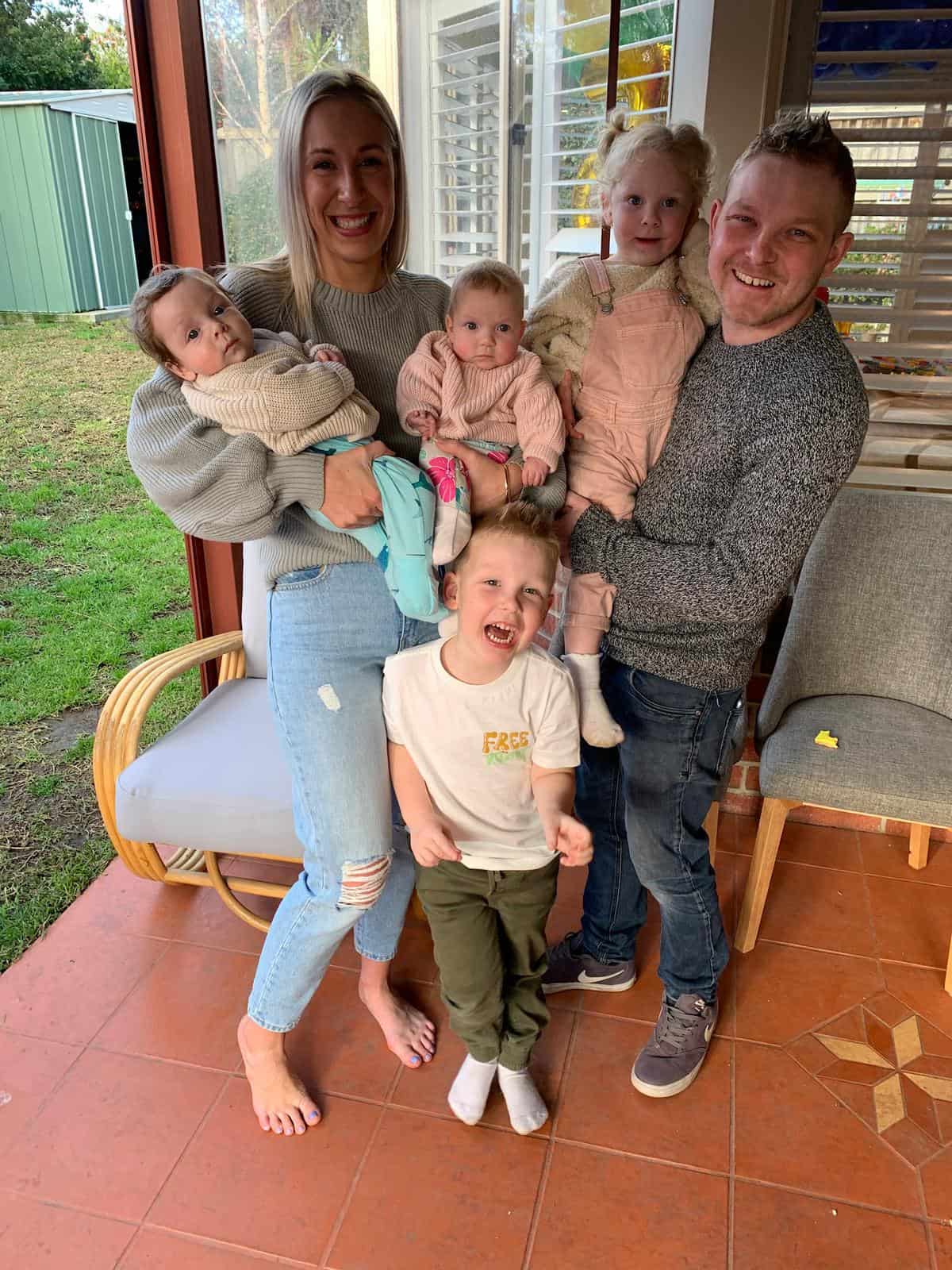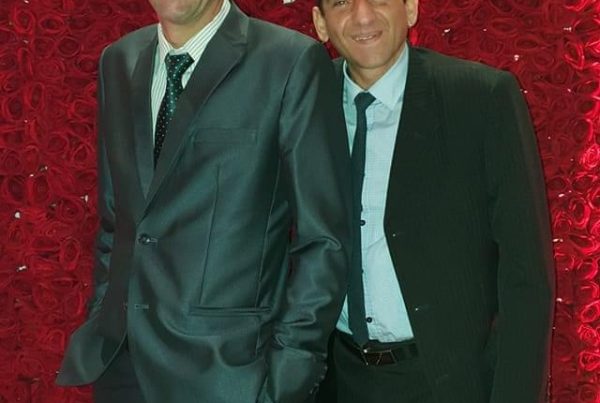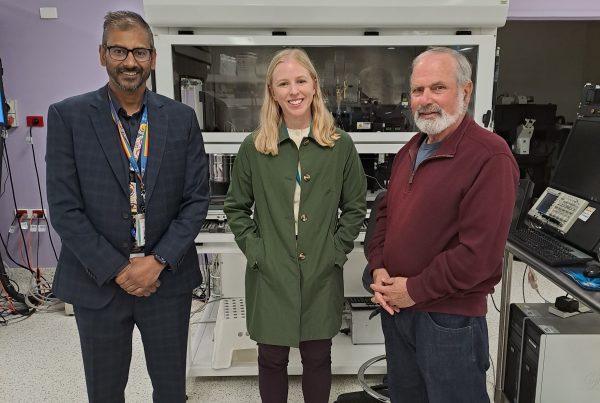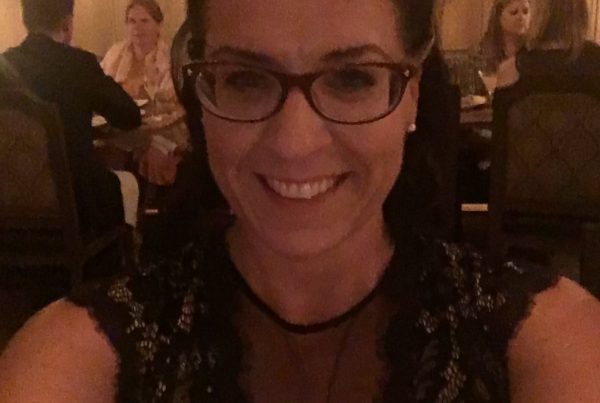Podcast: Play in new window | Download
Subscribe: Apple Podcasts | RSS
Murray on transplant
In this episode of the CFStrong podcast, we speak with Murray who had a double lung transplant ten years ago. We discuss Murray’s experience pre and post-transplant, how he managed the mental and emotional side of transplant, what he’s been up to for the last decade and his advice for approaching transplant.

Transcript
Voiceover: Welcome to the CF Strong Podcast. CF Strong covers the successes and challenges faced by those living with cystic fibrosis. You’ll hear first-person stories, conversations with health professionals, friends and partners. Just a heads up, guests may share their personal views about treatments and health management, but please remember, this is not medical advice and you should always follow the advice of your clinic team regarding your health.
Sam: Cool. So, hello everybody. Welcome to the CF Strong Podcast. I’m Sam Leefo, your host today. And today we have (inaudible 00:00:35). So, Murray, do you mind just telling us a bit about why you’re here today and what we’re going to be talking about?
Murray: Good day, Sam. How are you? So I guess I’m here today to talk about that I’ve had a double lung transplant. I’ve got cystic fibrosis, 29. I guess just my journey so far in life, I guess from my 29 years of cystic fibrosis. Then I guess transitioning to a transplant patient versus just a straight up cystic fibrosis.
Sam: It’s an incredible story and I’m really keen to dive into it. So, firstly though, I wanted just to discuss, recently been of a milestone of yours. You’ve come to, I think it’s close to 10 years since the transplant. Do you mind just telling everybody and telling me about what you’ve been up to the past 10 years and how you’ve been living this post-transplant life?
Murray: Yeah, so I guess in the last 10 years, I’ve jam packed it as much as I can. I am very, very fortunate. So I had my transplant at 19. And I guess the story goes that I was on the transplant list for four and a half months. So I was really lucky I wasn’t on there for very long. But from that I did my best to recover as quick as possible. I had a really good doctor at the time that I guess made sure of that. So I was in hospital for 13 days in ICU for two days. So my recovery is pretty quick from a double lung transplant. Then from that I was able to get back to work full-time work, and then travel overseas. So I went to Europe when I was 21 with my wife or partner at the time. And we got to travel Europe for three and a half months. We’ve been to America and then since getting back, bought a house. I’ve had four kids. So I’ve got I’ve got four kids under five. Fur kids just turned five, so four kids. And it’s crazy busy, but good fun.
Sam: Yeah. Sounds like you’ve been as busy as possible, which is always good to hear. Just going into the early days of the post-transplant life, how were you feeling after the post-transplant and what were the, were the main things going through your head, and how did you then focus on your recovery?
Murray: I think I guess my main focus was trying to get back to, I guess that normal life or what we perceive as that normal life. Some of those things, it may change, the medications you take, you normally take literally hundreds of tablets at the start and your, I guess — And there’s always complications or always different things that go on that I guess create different routines during your time. But overall, I just was really determined to make my donor and my donor family proud. And that’s always sort of been my mantra, I guess, around once I had my transplant. My big thing is, I guess I get this second chance at life. I was probably six months away, if not closer than to for it to be all over.
So for me, I’m like, “Okay, how can I, I guess, live this second part of my life to the fullest?” By doing everything I can possibly to, I guess, keep myself motivated going, but also I think sometimes I like to call them like calculated risks. So, going overseas or doing something specific. It’s like, okay, well, it could be a risk, but if I look through it, okay, how am I going to — If this happened, what would I do? If this happened, what would I do? And then at least I’m sort of living life to the fullest, but being cautious of the fact that I’ve had a — That I’m immunosuppressant, that I’ve got certain things that I guess I can’t — That I’ve got to be mindful of. Maybe I can’t, it’s not that I can’t do it, I just got to be more mindful of how I approach it.
Sam: So it seems like you had a fair bit going on in your head after the post-transplant in regards to how to take the next steps. Do you mind just telling us how you actually processed those thoughts and how you managed to stay positive and what steps you took to go in the right direction?
Murray: Yeah. I am very fortunate that, I guess I have a really good support network mainly my wife or girlfriend at the time. I think we were really close and was able to communicate that whole time around. How I was feeling. But most I guess my thought process the whole time was just how can I guess keep getting better, keep doing things to, I guess, stay healthy or if something, even I was a back step or for whatever reason you know, can I do anything different or is it out of my control, is in my control? You can only really do things that are in your control. So, what can I influence? It’s in my control that, I can do that.
And if it’s out of my control, then I guess that mindset is about being really, really mindful of gratitude and being really grateful for the, I guess, the opportunities. I’m pretty big on, I guess that mental health space of being positive and sort of trying to stay as positive as possible, even in those low moments. I think take your five minutes to be annoyed or frustrated or feel that emotion, bottle it. “Okay, yap, okay, why was I like that?” And then reset. So yeah, I think that’s probably how I think most of the time.
Sam: It is one of the reoccurring things I’ve definitely gotten from conversations doing this podcast is the strong mental capacity that people with CF have really had to learn and gain throughout their experiences. It is really always inspiring to hear everyone’s struggle and how they’ve managed just to keep pushing forward and always stay positive because as we know, it’s going to be a very hard sometimes. And just to lead on from that, I wanted to talk about your pre-transplant life. If you just wanted to talk to us about the months or years leading up to your transplant maybe a bit about your early life and just the thoughts and feelings you had about that whole situation.
Murray: Yeah. So it’s an interesting one. Just in the way of diagnosed at birth. My older brother has cystic fibrosis. So he’s in his late 30s and he was quite sick. Me growing up he was quite sick. I got to see that. And then over the time I think he sort of plateaued to where he sits and he still hasn’t had a transplant that’s still now. So he still doesn’t have a transplant. And I think I was that 11,12 had a few admissions in hospital, but wasn’t too crazy. Then I guess I got my ticket to be sick. So I’m assuming, I don’t remember exactly the details, but I guess, over that time I got sick and I got a few different bugs and whatever else.
I started to go in hospital more and more. By probably between 12 and 15, 12 and 16, I would’ve been in hospital, I don’t even know, maybe 25, 30 times, something like that. Then I think I’ve calculated just for one of those boring nights is that I think it was about three years, if you calculated all the weeks I was in hospital over that that time from zero to 19. So by the end of — So finished school really only just I pretty much through my whole school, I especially in high school, I would normally have like go to school and then the two-week school holidays I’d go to hospital and I have a tune up and then obviously go back to school.
That’s pretty much what always happened. And then I got sicker and sicker over that time. My lung function dropped and dropped and kept dropping to 40%, 30%. And then by the time I was like 18, I was still working because I was working like four hours, five hours, the usual shifts. I was really determined to sort of live that I guess perceived normal life or like live that, get a bit of normality. I was really the work and my colleagues were really good and they all just understood that buzz coughs that’s pretty much, that’s just what I do. At the time. It’s weird now, obviously, I don’t cough at all. And then, yeah, by the time I was 18, 19 I got really, really sick used to take an hour and a half to go for a shower three hours to go to the shops to look at like two or three shops extremely exhausted, fatigued and then oxygen.
And then sort of, for me, oxygen was the last sort of resort. So then oxygen and then it slowly starts to build the liters of oxygen and you get sicker and sicker. And then are you eligible for transplant? It’s changed now. It’s what it was. I think back in the day it was a bit more. 10 years ago it was a bit more like, “Okay, what’s your quality of life?” And I think now they sort of value that, but there’s a few other measures they take. So yeah, I had my transplant at 19 there. The way we did it was, I was out for six weeks in for three weeks. So yeah, literally in for three weeks of hospital out for six weeks in for three out for six.
And I did that for probably the last year before I had my transplant. So the reason why we did that was to try to keep me as healthy as possible. Especially that last part before my transplants then while I was on the list. I guess the healthier you are, even though you’re obviously never going to be healthy, but the more optimal you are hopefully the better your recovery can be ’cause your body’s not completely on the red line. So yeah, I guess that’s somewhat of a very quick version of pre-transplant.
Sam: Yeah. It’s sounds like an incredibly hard time for yourself and your family. Could you just talk us through what was going through your mind at that time? Because I can imagine it’s obviously an extremely scary time for yourself as well. But did having the transplant coming up, was that, for you, a positive feeling? Or was that still a very scary negative feeling? Like what was your thought process around the entire thing?
Murray: It’s a really interesting situation to be in, I think. I think you hope, you always hope for the good outcome. You always hear the bad outcomes. I’ve got at least six or seven friends that have all had transplants that have all passed away. I probably have one or probably two that have had transplants that’s still with us. So, knowing of those odds or those type of feelings, you think, “Oh God, what’s on the other side?” So I think your feeling is probably, as I say, I’m a pretty positive person, but I think you have to let yourself think of, “Okay, what’s the worst that happened?” So I think I really struggled with the part of the unknown. So when is it going to happen?
Like, I think everyone would. I feel like you sort of, you can’t get given a date. Is it going to last for — Are you going to be on the list for two months, four months, eight months? And I feel really sorry for the people that obviously are on the list for a long time. Because you’re always, you’re sort of on edge, “Where am I? Can I go here, can I do this? When’s it going to happen?” And then your life’s going to flip upside down the moment it happens. And you’ve got a whole another thing to I guess focus on once you’ve had a transplant. It literally flips to all of the stuff that you deal with post-transplant and immunosuppressants and a whole bunch of other things.
So I guess the unknown is the biggest feeling. I felt I was very fortunate that I had Danielle with me and family. But knowing, I guess I had a partner or someone that I loved and you know, I wanted to start a family with, have go overseas with and do all the things I guess I have ever dreamed of really pushed me to go, “Okay, if I get this chance, I’m going to take it with both hands. I’m going to make sure that I do the best I can.” And I think I feel very fortunate that I had that at that time in my life where I could be like, this is just — If I get this transplant and if it turns out the way I hope — That that’s the other part is that everyone has a different — What you learn very, very quickly, I guess is the transplant journey is just like pregnancy and birth in terms of everyone’s got a different story.
Murray: Everyone’s got a different way and a different thing that happens. And it’s so unique to every individual. But yeah, I feel very fortunate, I guess that the lungs that I got and the and the opportunity, I got to, I guess get a second chance and have kids and be able to share this side of it.
Sam: (Theme music) So it sounds like your support networks were really, really important for you to get through this situation in your life. Just how important was it to you to have your family around you? I know you mentioned your partner, was it Danielle, your partner?
Murray: Yap.
Sam: And now your wife, just having them around. Did it ever seem difficult to have a support network around when you felt so unsure about your future? How did that kind of weigh on the transplant process?
Murray: Yeah, it’s really interesting one, because the fear is obviously that you’re going to put your partner or whoever that support person is through a completely emotional ride. You are going through it, but you also what happens if you die, what happens if they commit — There’s a whole bunch of other things I guess inside of that. But for me, I think, I tried my best to communicate, I guess, like, “Are you sure? Are you very sure you are like, you’re okay to be here with me? If you want out, that’s fine. I get it. This is the situation and I completely understand.” So I guess communication constantly around — I guess trusting though that when that was said, like, “Yap, no, no, I’m here.” “I love a dearly boy.” Whatever.
Then trusting that, “Okay, that’s where it sits.” I probably wish that, now looking back, I probably wish that I’d seen a psychologist and not that I feel like I’ve got a pretty good mindset, but I always feel like if you have an ability to be able to have a conversation with someone that’s very neutral or you can I guess get support in a different way and have someone be able to bounce off in a way that you can give advice or give you thinking and I think we all do. I guess my best thinking is at nighttime. Some of those times when you are completely alone and you’re thinking, your mind starts to wonder, which is always good and bad. You might go into a spiral of the wrong way, but as well, it sometimes makes you reassess some of those things. So yeah, I guess that’s where —
Sam: Yeah. It’s a very important message, what you’re saying before. I can’t imagine what you must have gone through in those time, especially with the thoughts and your feelings about your loved ones around you. But what you’re saying about maybe seeing a psychologist, I think is a really good thing to talk about as well because it’s obviously chronic illnesses, it’s a very, very difficult thing physically and also mentally, and I feel like the mental part doesn’t really get addressed too often. So do you have any like, words of advice for anyone with cystic fibrosis right now who may be going through a similar situation in regards to a transplant or bad health, or just being unsure how to navigate things? What would you say to them after your experience about your mental health and also your positivity and then your post-transplant change?
Murray: Yeah, I guess there’s a few things in that. One is that I guess — This is just my opinion, obviously it’s not —
Sam: Yeah.
Murray: Yeah. But life will throw at you a whole different bunch of things. If you can I guess try to stay as positive as possible in the moment looking to how can you I guess support yourself or get better and whether that be through — People love like exercise and it makes them feel better, or whether it be through meditation or whether it be — Some of those things might feel uncomfortable at the time, but it’s sort of, I guess, putting yourself into an uncomfortable situation to see whether that may be the thing that works for you. Talking about seeing someone I think it’s, I guess, extremely important at some point, especially it’s like we always look after our bodies and our health and if we hurt our, I don’t know, broke a leg or whatever it would be, you do all these things, but the mind probably has had a more focus than it did 10 years ago.
But it’s like that tune-up of, how can you reset, learning skills. I think it’s probably the big one is about learning skills to be able to I guess be able to help your mental health and to be able to — If you are feeling down in the dumps, how can you — What are the things that I guess you’ve identified that can make you feel better. And whether that be going for exercise or I don’t know, going to get smashed or who knows. Or spending time on the couch and just eating chocolate.
Sam: Mm-Hmm. That’s a good one.
Murray: But all of those things I think are really important for you to know. But yeah, overall, I guess if someone’s in that, in the situation, they’re probably pre-transplant. I think it’s try to stay as, as sick as you obviously are. From my own experience, it was that I tried to stay as healthy and tried to do all the things that I possibly could that were in my control. I tried to do them to then hopefully help me on the other side. And obviously there’s times where you just feel like, “Is this ever going to end? Am I really — Is it really helping?” Or whatever. But I guess it’s those 1%, it’s those little things that probably do help. Then that self-doubt that comes in or that feeling the overwhelming feeling of, “Am I going to die? What’s next for me? Am I going to lose friendships? Am I going to lose this? I guess it’s a trying to make sure that you are having conversations with all the different people and your supports.
And if you don’t feel like, you know, that’s your support, then how can maybe it be that you see someone or however that plays out. But I think it’s always going to be a really challenging time in your life. That moment when you’re before transplant, you’re waiting on a list and it’s the unknown. It’s so uneasy. It’s just like COVID really. You didn’t know when it was going to end. You didn’t know what was going on. I sort of talk to that all the time with people I know is around the uncomfortable feeling of the unknown is really challenging. I had that, obviously transplant, with COVID, was the same thing. It’s like, “Okay, can I go outside? Am I going to get sick? Am I going to get COVID?” Yeah, it’s all part of the fun, I guess of life. But it sucks sometimes.
Sam: Yeah. 100% the unknown, it’s the terrifying frontier. Well, since living your post-transplant life, and now that you’ve gone through the unknown, what have been the greatest highlights you’ve had since your transplant and what things have been made possible due to the transplant, and what’s things can you share to everybody that has been so worth going through the unknown?
Murray: Yeah, I think first and foremost is being able to get married and then to my wife Danielle. And then from that being able to have four little kids, or four kids, I should say. So, we certainly are busy. But it’s fun busy. I love being a parent. I love being a dad, it’s pretty amazing. I remember when I was little and see if you had CF it was pretty much like you’re probably not going to ever have kids. So, now I think about it. I think, “Oh my God, this is just incredible.” I get to get these little mini-maze and I’ve got two boys, two girls. So it’s pretty awesome.
And then I think being able to travel but also funnily enough, just being able to just do day-to-day tasks when you’re pretty sick near the end, it’s about, I guess, being able to again, go for a shower and it’s only a few minutes, or it’s so funny when I had my transplant and then being able to. I played tennis and going back and playing tennis, and I couldn’t understand why I kept hitting the ball. Like when I was sick the way I played tennis was very different to the way I can play now, because I’ve got more — I can breathe. So the way I used to play is pretty much lob the ball up as long as I can, so I can run back into the middle and gives me time to get back.
Murray: Whereas now I’m like, “Are they going to hit the ball back anytime soon?” Because I finally get — It’s a difference in, I guess being able to breathe and that feeling. And then lastly, I think just travel, being able to see the world, being able to do things that I guess I never thought was possible. Went to Tomatina October Fest, Ring of the Bulls, Disneyland, Disney World and hoped to obviously go to other places in the world when I’m probably a bit older and I don’t have such a young family, but –
Sam: Get rid of the kids first.
Murray: Well, hopefully they can come with us, but —
Sam: Even better.
Murray: Yeah. But in general just being able to, I guess, do things that you had on your bucket list is probably the big one. Trying to make my whole thing is trying to make my donor family and my donor proud and making sure that they know just that I want to — When I got this chance, I’ll take it with everything and pack as much as I possibly can into the second phase of life, because it’s pretty damn cool that I’m here to be here and be part of it.
Sam: I’m sure you’ve made them very proud. It’s a really incredible story. So thank you so much for sharing it with us. Just before we finish up for the day, is there any final things you want to say to the CF community or to me, or just get some words out there?
Murray: Oh, just that I think that the CF Podcast is a great initiative. I think it’s good to hear everyone’s different stories, the different ways people do things, but also some familiarities and I guess themes that run through it. Unfortunately, cystic fibrosis because of the condition it is, and I mean, it’s changed a bit with medications and things, but because of what it is we can’t all go to a place and all congregate and meet and say good day and have a stronger community in face to face sort of situation. So I think having these conversations or having people understand that they’re not alone and that they can, I guess, reach out to other people that going potentially through an experience or through the same experiences.
So I would say to anyone that if you want to ask any questions, I’m sure there’s a lot of CFs out there of all different ages that would be more than willing to have a chat or help. So don’t feel alone and make sure you reach out to whomever at wherever they organize, whatever CF is in the states or doctors or whoever to ask questions of people. ‘Cause The more questions you’re asked, the more knowledge you have and the probably it becomes easier because you have more knowledge to be able to face whatever’s coming your way.
Sam: That’s a great way to end it. End it. So thank you so much for coming on the podcast, Murray, it’s been an absolute pleasure to talk to
Murray: You. Thanks having me.
Sam: And yeah, thanks everyone for listening. We’ll see you next time.
Voiceover: Thanks for listening to this episode of the CF Strong Podcast. Make sure you subscribe on your favorite podcast listening platform so you don’t miss the next episode. And if you enjoyed this podcast, we’d really appreciate if you could leave us a review. It helps other people find CF Strong or share us with your friends. Also, a quick reminder that the views expressed in the CF Strong Podcast may not be reflective of Cystic Fibrosis Community Care’s viewpoints. The podcasts are designed to share information and provide insight into the lives of those living with cystic fibrosis around Australia. This podcast was made possible thanks to support provided by the Australian government and was produced by CF Community Care and CF Western Australia. Our theme music is Spark of Inspiration by Shane Ivers from Silverman Sound. Thanks for listening, and we’ll talk to you next time.
This podcast was published in November 2022. If you would like to share your story, please contact us at admin@cfcc.org.au. We’d love to hear from you and so would our listeners.




